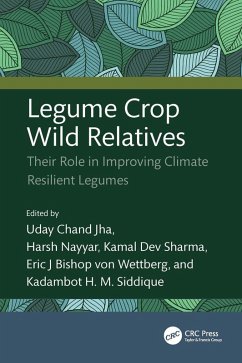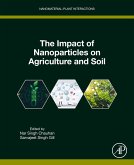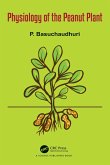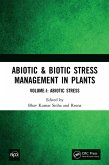Legume Crop Wild Relatives (eBook, ePUB)
Their Role in Improving Climate Resilient Legumes
Redaktion: Chand Jha, Uday; H. M. Siddique, Kadambot; Bishop von Wettberg, Eric J; Dev Sharma, Kamal; Nayyar, Harsh
52,95 €
52,95 €
inkl. MwSt.
Sofort per Download lieferbar

26 °P sammeln
52,95 €
Als Download kaufen

52,95 €
inkl. MwSt.
Sofort per Download lieferbar

26 °P sammeln
Jetzt verschenken
Alle Infos zum eBook verschenken
52,95 €
inkl. MwSt.
Sofort per Download lieferbar
Alle Infos zum eBook verschenken

26 °P sammeln
Legume Crop Wild Relatives (eBook, ePUB)
Their Role in Improving Climate Resilient Legumes
Redaktion: Chand Jha, Uday; H. M. Siddique, Kadambot; Bishop von Wettberg, Eric J; Dev Sharma, Kamal; Nayyar, Harsh
- Format: ePub
- Merkliste
- Auf die Merkliste
- Bewerten Bewerten
- Teilen
- Produkt teilen
- Produkterinnerung
- Produkterinnerung

Bitte loggen Sie sich zunächst in Ihr Kundenkonto ein oder registrieren Sie sich bei
bücher.de, um das eBook-Abo tolino select nutzen zu können.
Hier können Sie sich einloggen
Hier können Sie sich einloggen
Sie sind bereits eingeloggt. Klicken Sie auf 2. tolino select Abo, um fortzufahren.

Bitte loggen Sie sich zunächst in Ihr Kundenkonto ein oder registrieren Sie sich bei bücher.de, um das eBook-Abo tolino select nutzen zu können.
In the proposed edited book, we will highlight the importance of various potential traits of crop wild relatives which are yet to be properly harnessed for designing future climate-resilient grain legumes.
- Geräte: eReader
- mit Kopierschutz
- eBook Hilfe
Andere Kunden interessierten sich auch für
![Legume Crop Wild Relatives (eBook, PDF) Legume Crop Wild Relatives (eBook, PDF)]() Legume Crop Wild Relatives (eBook, PDF)52,95 €
Legume Crop Wild Relatives (eBook, PDF)52,95 €![The Impact of Nanoparticles on Agriculture and Soil (eBook, ePUB) The Impact of Nanoparticles on Agriculture and Soil (eBook, ePUB)]() The Impact of Nanoparticles on Agriculture and Soil (eBook, ePUB)128,95 €
The Impact of Nanoparticles on Agriculture and Soil (eBook, ePUB)128,95 €![Physiology of the Peanut Plant (eBook, ePUB) Physiology of the Peanut Plant (eBook, ePUB)]() P. BasuchaudhuriPhysiology of the Peanut Plant (eBook, ePUB)62,95 €
P. BasuchaudhuriPhysiology of the Peanut Plant (eBook, ePUB)62,95 €![Microbiome Drivers of Ecosystem Function (eBook, ePUB) Microbiome Drivers of Ecosystem Function (eBook, ePUB)]() Microbiome Drivers of Ecosystem Function (eBook, ePUB)128,95 €
Microbiome Drivers of Ecosystem Function (eBook, ePUB)128,95 €![Essential Minerals in Plant-Soil Systems (eBook, ePUB) Essential Minerals in Plant-Soil Systems (eBook, ePUB)]() Essential Minerals in Plant-Soil Systems (eBook, ePUB)128,95 €
Essential Minerals in Plant-Soil Systems (eBook, ePUB)128,95 €![Abiotic & Biotic Stress Management in Plants (eBook, ePUB) Abiotic & Biotic Stress Management in Plants (eBook, ePUB)]() Abiotic & Biotic Stress Management in Plants (eBook, ePUB)54,95 €
Abiotic & Biotic Stress Management in Plants (eBook, ePUB)54,95 €![Symbiotic Association of Microorganisms with Medicinal and Herbal Plants (eBook, ePUB) Symbiotic Association of Microorganisms with Medicinal and Herbal Plants (eBook, ePUB)]() Symbiotic Association of Microorganisms with Medicinal and Herbal Plants (eBook, ePUB)52,95 €
Symbiotic Association of Microorganisms with Medicinal and Herbal Plants (eBook, ePUB)52,95 €-
-
-
In the proposed edited book, we will highlight the importance of various potential traits of crop wild relatives which are yet to be properly harnessed for designing future climate-resilient grain legumes.
Dieser Download kann aus rechtlichen Gründen nur mit Rechnungsadresse in A, B, BG, CY, CZ, D, DK, EW, E, FIN, F, GR, HR, H, IRL, I, LT, L, LR, M, NL, PL, P, R, S, SLO, SK ausgeliefert werden.
Produktdetails
- Produktdetails
- Verlag: Taylor & Francis eBooks
- Erscheinungstermin: 4. November 2024
- Englisch
- ISBN-13: 9781040133002
- Artikelnr.: 72335439
- Verlag: Taylor & Francis eBooks
- Erscheinungstermin: 4. November 2024
- Englisch
- ISBN-13: 9781040133002
- Artikelnr.: 72335439
- Herstellerkennzeichnung Die Herstellerinformationen sind derzeit nicht verfügbar.
Dr. Uday C Jha has been working in the area of grain legume breeding, genetics, and genomics for both biotic and abiotic stress tolerance since 2010 at the Indian Institute of Pulses Research, Kanpur, ICAR, India. He has more than 60 peered reviewed international publications including two edited books published by Springer Nature. He is associated in developing 8 chickpea varieties. He is also serving as subject editor in various journals of international repute. Dr. Harsh Nayyar is currently a Professor at Panjab University, India. Dr Nayyar has been working on the responses of various food legumes (chickpea, lentil, beans) to drought, cold, heat, salt and metals, for the past 15 years. He has published more than 150 research articles in peer¿reviewed, high¿impact scientific journals. Recently, he was rated among the top 2% of Indian scientists in a global ranking by Stanford University, USA, published in PLOS Biology.. Dr. Kamal Dev Sharma is Professor and Head, Department of Agricultural Biotechnology, CSKHPKV Palampur, India. His area of expertise includes plant genomics and abiotic & biotic stresses of plants with a primary focus on Fusarium wilt and cold stress in chickpea. He has published more than 50 research and review articles in internationally reputed journals, along with several book chapters. Dr. Eric J Bishop von Wettberg is Professor at the University of Vermont. He has vast experience in conducting research in areas of population genomics, domestication of legumes, symbiosis, conservation genetics, landscape genetics, and symbiont and microbial mediation of plant traits. He serves as editorial board member for various international jpurnals. He has more than 100 peered reviewed publications in reputed journals. Professor Kadambot H.M. Siddique has more than 35 years of experience in agricultural research, teaching, and management in both Australia and overseas. He has developed a national and international reputation in agricultural science especially in the fields of crop physiology, production agronomy, farming systems, genetic resources, and breeding research in cereal, grain and pasture legumes, and oilseed crops. He is the Hackett Professor of Agriculture Chair and Director of The UWA Institute of Agriculture at The University of Western Australia. Professor Siddique is a Highly Cited Researcher in two fields, agricultural science and plant and animal science (Clarivate).
Wild Chickpea: Treasure of Novel Diversity for Crop Improvement
Back to wild: Designing future climate resilient cultivars of urdbean and mungbean
Exploiting Arachis wild relatives for increasing genetic diversity and resilience in groundnut
Crop Wild Relatives of Lentil (Lens culinaris Medik.)
Common bean (Phaseolus vulgaris) Crop Wild Relatives: Their Role in Improving Climate-Resilient common bean
Widening the genetic base potential of soybean harnessing wild relatives: A multidimensional approach
Cowpea Wild Relatives for Cowpea Sustainability Through Introgression Breeding
Crop wild relatives of pea (Pisum sativum) for designing future climate resilient cultivars
An ethnobotanical review of tuberous legumes as viable crops in Vermont
Soybean wild relatives (SWRs) for designing future climate resilient cultivars
Back to wild: Designing future climate resilient cultivars of urdbean and mungbean
Exploiting Arachis wild relatives for increasing genetic diversity and resilience in groundnut
Crop Wild Relatives of Lentil (Lens culinaris Medik.)
Common bean (Phaseolus vulgaris) Crop Wild Relatives: Their Role in Improving Climate-Resilient common bean
Widening the genetic base potential of soybean harnessing wild relatives: A multidimensional approach
Cowpea Wild Relatives for Cowpea Sustainability Through Introgression Breeding
Crop wild relatives of pea (Pisum sativum) for designing future climate resilient cultivars
An ethnobotanical review of tuberous legumes as viable crops in Vermont
Soybean wild relatives (SWRs) for designing future climate resilient cultivars
Wild Chickpea: Treasure of Novel Diversity for Crop Improvement
Back to wild: Designing future climate resilient cultivars of urdbean and mungbean
Exploiting Arachis wild relatives for increasing genetic diversity and resilience in groundnut
Crop Wild Relatives of Lentil (Lens culinaris Medik.)
Common bean (Phaseolus vulgaris) Crop Wild Relatives: Their Role in Improving Climate-Resilient common bean
Widening the genetic base potential of soybean harnessing wild relatives: A multidimensional approach
Cowpea Wild Relatives for Cowpea Sustainability Through Introgression Breeding
Crop wild relatives of pea (Pisum sativum) for designing future climate resilient cultivars
An ethnobotanical review of tuberous legumes as viable crops in Vermont
Soybean wild relatives (SWRs) for designing future climate resilient cultivars
Back to wild: Designing future climate resilient cultivars of urdbean and mungbean
Exploiting Arachis wild relatives for increasing genetic diversity and resilience in groundnut
Crop Wild Relatives of Lentil (Lens culinaris Medik.)
Common bean (Phaseolus vulgaris) Crop Wild Relatives: Their Role in Improving Climate-Resilient common bean
Widening the genetic base potential of soybean harnessing wild relatives: A multidimensional approach
Cowpea Wild Relatives for Cowpea Sustainability Through Introgression Breeding
Crop wild relatives of pea (Pisum sativum) for designing future climate resilient cultivars
An ethnobotanical review of tuberous legumes as viable crops in Vermont
Soybean wild relatives (SWRs) for designing future climate resilient cultivars







